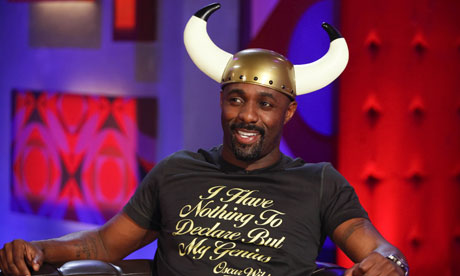I’ve been following the online kerfuffle among some fanboys that Idris Elba is playing Heimdall in Thor, which made the front page of Yahoo!Canada this morning. Some are saying that this is political correctness run amok, others are saying that this is “messing with the natural order of things.” Some are just peeved that their beloved series is not being adapted in the way that they want it to be.
If I may distill the criticism down to its essence: a black actor is playing Heimdall, a white Norse God who was “the whitest of the gods” (thanks Wikipedia!), is wrong because it is disrespectful to both the comic book source material and Norse mythology. However, keep in mind that all of this is frame in the decidedly racist discourse of “I’m not a racist, but….”

Comic book film casting will always be controversial, regardless of characters (see: Keanu Reeves as John Constantine) simply because different people envision adaptations differently. Some want it exactly as the source material is, usually the case with fanboys and fangirls. This is next to impossible, by the very nature of adapting one medium to another. The method of adapting a narrative is the process of first reading the source material, interpreting it, and then recreating it. In addition, because adaptations are to a different medium, they are re-mediations, that is, specifically translations in the form of inter-semiotic transpositions from one sign system to another. Within the process of such a transposition from one medium to the next, both the signs and the signifiers change.
Therefore, a film adaptation is, by its very nature, different from its comic book (or mythological) antecedent/source. It relies on different sign systems and on different ways of communicating meaning. Just as the superhero comic book has a language, a set of conventions through which the author can communicate meaning, so too does the film. It is through this process of re-mediation that those subtle and not so subtle changes occur within the adaptation. Negotiating the filmmaker’s interpretation of the adaptation with the source material is a tricky thing, especially when the audience is aware of the source material and when that adaptation is explicitly linked to its comic book antecedent. Unavoidably, the adaptation becomes a kind of intertextuality as comic book fans are well acquainted with the diegetic worlds from which the adaptations drew, identifying references not only between the original text and its adaptation but also from the wider universe within which that original text is situated. Furthermore, Thor cannot be a simple transposition of the comic book source material onto film because of the intertextuality with other Marvel films – especially the upcoming Avengers movie, which will draw all of these characters together.
I, for one, have faith in Kenneth Branagh’s vision for Thor, including any changes to the source material. And, frankly, I think Idris Elba’s going to do a fantastic job – he was absolutely brilliant in both RocknRolla and The Losers.

Shelley Smarz is a comic book scholar and business woman. She spends her time advocating for silly things like women’s rights and increasing both equal representation and visibility for all (whether in popular culture or in business). Stay tuned for Shelley’s next column where she dissects the website Boycott Thor!




Yes. Idris Elba = total badass. Heimdall = total badass. Therefore Idris Elda = Heimdall.
Sir, I like your logic.
At what point does it not become hip/cool/badass? What if they picked him to play Thor?
I think it depends on how much of the character’s identity is race. Many have given the example of Ultimate Nick Fury. You don’t enjoy the character less because the Ultimate version is Black. But a white man playing Black Panther would seem strange as the character is an African Prince.
Idris Elba as Thor? Why not? Is it the traditional representation of the character, no. Could it be an interesting reinterpretation? Yes.
I ask our readers: would it bother you if the next James Bond was Black? Or the next Doctor Who Chinese? This wouldn’t bother me.
I don’t have a problem with characters changing race. Hey, it happened with Nick Fury. Who would’ve ever figured Samuel L. Jackson would play Nick Fury. There are certain actors who can play any character. Idris Elba is one of those actors. He was awesome as Roque in The Losers.
I could see Colin Salmon playing Bond… I could also see him playing Dr. Who as well.
I’m going to toss this out there: I don’t give a shit whether Spider-Man is Black, Asian or Mexican.
Same goes with Superman.
Skin color doesn’t really change the essence of a character.
Nice call.
All good points but my example is the Norse God of Thunder. I’m all for Justin Timberlake playing Malcom X in the remake but there has to be something said for some degree of context
So if race is a non issue… what about gender? Could Thor be convincing as Thor-ette?
I think the difference is that Thor and the Asgardians are fictional characters which have changed over the years, influenced by those who were telling the story (kind of like history being told by the perspective of the winners).
Over the years, stories with these mythical characters have been told, retold, and appropriated by other cultures (the Romans appropriating Greek mythical figures, renaming them and recasting them in service of their own ideologies – i.e., to deify the domination of the Roman Empire) as well as by authors along the years. The Ultimate universe is a great example of modern day myths being transformed by the culture in which they are being told and by the authors who are telling them. I look at comic book film adaptations as an opportunity for these stories to be retold and recast.
I’m going to throw Andy Lau into the running for a non-white Doctor Who. Djimon Hounsou would also make an awesome Doctor. I’d nominate him for Bond as well.
Well, considering Thor’s a chauvinist, it might be a little awkward if he suddenly woke up with lady bits.
Anthony I have to call you out on this one. How can a white man playing an African prince “seem strange” yet a black man playing a Norse god be “why not”? am I missing something?
Why can’t I be upset if my Norse god is not Norse?
Why can’t I expect a bit of authenticity (we all have preconceived notions of what a Norse god looks like, the Chinese have preconceived notions of what Norse gods look like as do the Arabs, the Latins, the Africans and the Slavs) when watching my Norse god movie?
Pete, if the character is a Mongolian warlord and a Portugese actor is playing him of course it changes the essence of the character.
So would it bother you if your Egyptian god movie did have real Alligator-Headed actors?
Not according to your column above: the same argument holds for gender as it does for race. You’re interpreting Thor as a chauvinist but the context of the argument revolves around Branagh’s film and his view of the characters. Norse mythology was an ancient people’s religion that has been worked into an action movie. We should expect Jackie Chan as battlin’ Jesus next year.
Bottom line: Thor is a movie, a work of fiction. If you don’t like anything about the movie don’t see it. Speak with your dollars.
If the movie is striving for authenticity, then someone who looks like a viking should be playing a Norse God. I mean, if we were talking about Asian Gods and they were being played by Caucasians, I’m sure someone would be upset.
Although this reminds me of the hilarity that ensued when they showed the first Green Lantern trailer and a lot of people who’ve never read a comic were upset that a character they were familiar with from Justice League cartoons as being African-American, was now being played by a Caucasian!
Surprisingly enough, little mention is being made of the fact that Tadanobu Asano, a Japanese actor, is playing Hogun, one of the Warriors Three. I guess Kirby’s Hogun kind of looked like Genghis Khan, so they cast the guy that played Khan in Mongul. Stan Lee always said he envisioned Charles Bronson as Hogun…
Anyway, personally, I think it looks kind of weird, but it won’t affect my enjoyment of the film in any way whatsoever. It’s a Constantine situation, where they decided to go with casting that did not fit the established character.
Actually, with my previous comment I was just being a smart ass.
Gah! I hit submit instead of changing tabs on my browser.
But, you’re right, Scott. Anything can be changed in the adaptation process.
Like I said, change is a double edged sword in terms of adaptations. On the one hand, it’s essential – you’re transforming the work from one medium to another. On the other hand, it’s unavoidable, especially when looking at the sheer number of comic book narratives where Thor is a character (his first appearance was in 1962; so you have almost 40 years worth of comic book narrative to transform into what will probably be about 2-2.5 hours’ worth of filmic narrative). What gets included? What gets excluded? What gets changed?
On the one hand, the adaptation and its source material are not two discrete creations. An adaptation is shaped by its source material and you can’t separate the two completely. On the other hand, you cannot demand absolute accuracy or absolute faithfulness to the source material from its adaptation due to the transformative nature of an adaptation. So, ultimately, questions of what gets included, excluded, or changed in an adaptation is determined by a combination of the creator(s)’s interpretation of the source material, his/her vision of the adaptation, and any limitations or constrictions placed on the creation (such as Thor becoming part of a series of films that will help influence how the Avengers film will turn out).